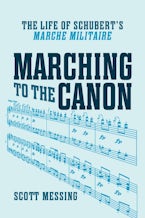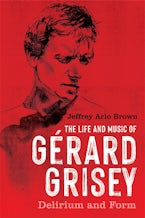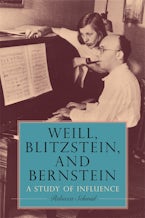
Title Details
334 Pages
22.8 x 15.2 cm
16 line illus.
Series: Eastman Studies in Music
Series Vol. Number:
165
Imprint: University of Rochester Press
Self-Quotation in Schubert
Ave Maria, the Second Piano Trio, and Other Works
- Description
- Contents
- Reviews
Examines the history of musical self-quotation, and reveals and explores a previously unidentified case of Schubert quoting one of his own songs in a major instrumental work.
Enthusiasts and experts have long relished Schubert's quotations of his own music. This study centers on a previously unidentified pairing: "Ave Maria," one of his most beloved songs, and the Piano Trio no. 2, a masterpiece that holds a unique position in his career. Messing's Self-Quotation in Schubert interrogates the concept of self-quotation from the standpoints of terminology and authorial intent, and it demonstrates, for the first time, how Schubert's practice of self-quotation relates to prevailing practices in the late eighteenth and early nineteenth centuries. Messing goes on to analyze in detail the musical relationships between the two works and to investigate thecircumstances that led Schubert to compose each of them.
"Ave Maria" is one of the few Schubert songs for which we have documentation of some early private performances, and the trio stood at the heart of Schubert's only public concert devoted to his works. Messing establishes that Schubert sought to convey an associative meaning with this self-quotation, trusting in his contemporaries' familiarity with the original melody and with Walter Scott's poem, a text that carried profound resonances in Catholic Vienna. Scrutinizing this evidence yields the symbolic purpose behind Schubert's allusion to "Ave Maria" in the piano trio: honoring the recently deceased Beethoven andvalidating Schubert as his legatee.
SCOTT MESSING is Charles A. Dana Professor of Music Emeritus at Alma College.
Enthusiasts and experts have long relished Schubert's quotations of his own music. This study centers on a previously unidentified pairing: "Ave Maria," one of his most beloved songs, and the Piano Trio no. 2, a masterpiece that holds a unique position in his career. Messing's Self-Quotation in Schubert interrogates the concept of self-quotation from the standpoints of terminology and authorial intent, and it demonstrates, for the first time, how Schubert's practice of self-quotation relates to prevailing practices in the late eighteenth and early nineteenth centuries. Messing goes on to analyze in detail the musical relationships between the two works and to investigate thecircumstances that led Schubert to compose each of them.
"Ave Maria" is one of the few Schubert songs for which we have documentation of some early private performances, and the trio stood at the heart of Schubert's only public concert devoted to his works. Messing establishes that Schubert sought to convey an associative meaning with this self-quotation, trusting in his contemporaries' familiarity with the original melody and with Walter Scott's poem, a text that carried profound resonances in Catholic Vienna. Scrutinizing this evidence yields the symbolic purpose behind Schubert's allusion to "Ave Maria" in the piano trio: honoring the recently deceased Beethoven andvalidating Schubert as his legatee.
SCOTT MESSING is Charles A. Dana Professor of Music Emeritus at Alma College.
Introduction
Commencements and Contexts
On the Reception of Schubert's Self-Quotations
Two Scores and Their Musical Relationships
Parents and Children: On the Background to "Ave Maria"
From "Ave Maria" to Trio
"Dedicated to nobody, save those who find pleasure in it."
Contexts and Conclusions
Commencements and Contexts
On the Reception of Schubert's Self-Quotations
Two Scores and Their Musical Relationships
Parents and Children: On the Background to "Ave Maria"
From "Ave Maria" to Trio
"Dedicated to nobody, save those who find pleasure in it."
Contexts and Conclusions
"This book offers a much-needed study of Schubert and his practices of self-quotation, a type of musical allusion that has yet to receive a book-length study of any kind, either one devoted to the music of a single composer or to the phenomenon as a whole. Messing's focus is obviously Schubert, but he has much to say about the practice in general, and his analysis will surely influence all subsequent discussions." .
"Christopher Reynolds, professor of music at University of California" Davis
"Meticulous scholarship. Messing...[frames] this music elegantly within its historical context. His detailed narrative makes it difficult to deny that the [connections he has uncovered...] would have been fully appreciated by all who attended Schubert's Privat-Concert on 26 March 1828. Messing's intriguing discourse blends musical analysis, historical musicology, hermeneutics and psychology that, like Schubert's second piano trio, is intended for nobody except those who find pleasure in it, and it is likely that there will be many who do so." Nicholas Rast, Integral Music Theory
Hardcover
9781580469654
May 2020
$125.00 / £105.00
Ebook (EPUB)
9781787449671
May 2020
£24.99 / $29.95
Ebook (EPDF)
9781787448841
May 2020
£24.99 / $29.95
Title Details
334 Pages
2.28 x 1.52 cm
16 line illus.
Series: Eastman Studies in Music
Series Vol. Number:
165
Imprint: University of Rochester Press







![Schubert in the European Imagination [2 volume set]](https://boydell-brewer-uk.imgix.net/missing-cover.png)









